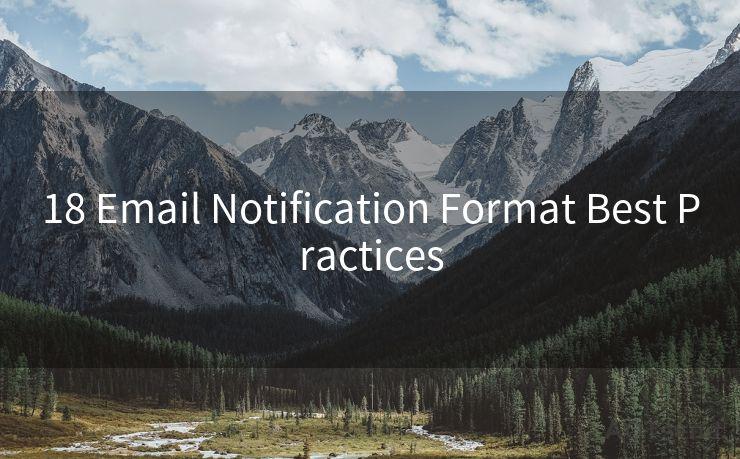18 Email Notification Format Best Practices




In the digital age, email notifications are a crucial part of any online business or service. They keep users informed, engaged, and connected. However, with the influx of emails in our inboxes, it's essential to craft notifications that stand out and are user-friendly. Here are 18 best practices for formatting your email notifications to enhance user experience and, incidentally, boost your SEO efforts.
1. Clear and Concise Subject Lines
The subject line is the first thing recipients see. Make it short, sweet, and to the point, accurately reflecting the email's content.
2. Personalization
Use the recipient's name in the greeting to create a more personal connection. Personalized emails have higher open and click-through rates.
3. Scannable Content
Use bullet points, bold text, and section headers to make your email easy to scan and understand. Avoid long paragraphs of text.
4. Mobile-Friendly Design
Ensure your emails are mobile-responsive, as most emails are now opened on mobile devices.
5. Call to Action (CTA)
Include a clear CTA button or link that stands out and encourages the desired action.
6. Unsubscribe Option
Always provide an unsubscribe link to comply with email marketing regulations and respect user preferences.
7. Avoid Spam Triggers
Steer clear of words and phrases that might trigger spam filters, such as "free," "win," or "prize."
8. Balance Text and Images
Use images sparingly and ensure they have alt text for accessibility and SEO purposes.
9. Contact Information
Include your contact information, such as an email address or phone number, to build trust and credibility.
10. Testimonials or Reviews
If possible, include positive testimonials or reviews from satisfied customers to boost credibility.
11. Social Media Links
Provide links to your social media profiles to increase engagement and followers.
12. Privacy Policy Link
Include a link to your privacy policy to assure recipients that their data is safe.
13. A/B Testing
Experiment with different subject lines, content, and CTAs to see what works best for your audience.
14. Plain Text Option
Offer a plain text version of your email for those who prefer a simpler format or have email clients that don't support HTML.
15. Consistent Branding
Maintain a consistent brand voice, color scheme, and logo usage in all your email communications.
16. Segmentation
Tailor your emails to specific segments of your audience for more relevant and engaging content.
17. Tracking and Analytics
Utilize tracking tools to monitor open rates, click-through rates, and other metrics to improve future campaigns.
🔔🔔🔔
【AOTsend Email API】:AOTsend is a Managed Email Service for sending transactional emails. Support Email Types: reminders, authentication, confirmations, notifications, verification codes, invoices, password resets, account activations, billing statements, two-factor authentication (2FA), and one-time passwords (OTP) emails, etc. $0.28 per 1000 Emails. 99% Delivery, 98% Inbox Rate.
You might be interested in:
Why did we start the AOTsend project, Brand Story?
What is a Managed Email API, How it Works?
Best 25+ Email Marketing Platforms (Authority,Keywords&Traffic Comparison)
Best 24+ Email Marketing Service (Price, Pros&Cons Comparison)
Email APIs vs SMTP: How they Works, Any Difference?

18. Follow-Up Emails
Send a follow-up email to those who don't respond, offering additional information or a special offer.
By implementing these best practices, you can create email notifications that not only engage your audience but also indirectly support your SEO efforts by driving traffic to your site and increasing brand awareness. Remember, every interaction with your brand is an opportunity to build trust and loyalty, so make sure your emails reflect the quality and professionalism of your business.




Scan the QR code to access on your mobile device.
Copyright notice: This article is published by AotSend. Reproduction requires attribution.
Article Link:https://www.mailwot.com/p6233.html



